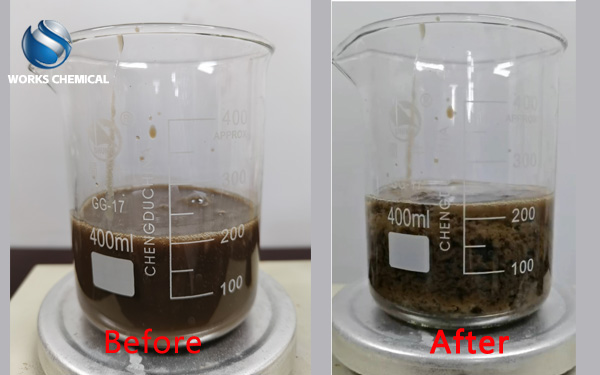
In the pharmaceutical production process, a large amount of wastewater will be produced, and these wastewater will often form sludge after treatment, that is, medical sludge. Medical sludge contains drug residues, microorganisms, heavy metals and other harmful substances, if not properly treated, will not only cause serious pollution to the environment, but also may pose a threat to human health. Therefore, how to efficiently and environmentally friendly treatment of medical sludge has become an important topic of common concern in the pharmaceutical industry and environmental protection field. As a kind of chemical agent that can significantly improve the dewatering property of sludge, sludge enhancer has shown broad application prospects in medical sludge treatment.

Characteristics and treatment challenges of pharmaceutical sludge
Medical sludge has the characteristics of high moisture content, high viscosity and complex composition. Because it contains a large number of microorganisms and organic matter, it is difficult to separate the sludge particles, and the dehydration performance is very poor. In addition, medical sludge may also contain drug residues such as antibiotics, hormones, as well as toxic and harmful substances such as heavy metals, which require special attention in the treatment process. Traditional sludge treatment methods, such as natural drying, mechanical dehydration, etc., are often difficult to achieve the ideal treatment effect, and secondary pollution may be generated during the treatment process.
Two, the principle and advantages of sludge synergists
Sludge enhancer is a chemical agent specially used to improve the dewatering performance of sludge. By changing the surface properties of the sludge particles, destroying the colloidal structure of the sludge and reducing the viscosity of the sludge, the sludge particles are easier to separate and dehydrate. Compared with traditional sludge treatment methods, sludge enhancers have the following advantages:
Significantly improve the dewatering efficiency: sludge enhancer can significantly reduce the moisture content of sludge, improve the dewatering efficiency and shorten the dewatering time.
Reduce the treatment cost: Because the sludge synergist can improve the dewatering performance of the sludge, reduce the energy consumption and wear of the dewatering equipment, thus reducing the treatment cost.
Reduce secondary pollution: no harmful substances are produced during the treatment of sludge synergists, and the treated sludge is easier to carry out subsequent treatment, such as incineration, landfill or resource utilization, thereby reducing secondary pollution.
Third, the application of sludge synergist in medical sludge treatment
In the treatment of medical sludge, the application practice of sludge synergists has achieved remarkable results. The following is a typical application case:
A medical enterprise uses a sludge enhancer to treat the sludge produced in its production process. First, the sludge synergist is added to the sludge in accordance with a certain proportion and fully mixed. Then, the mixed sludge is sent to the mechanical dewatering equipment for dewatering treatment. After the treatment of sludge enhancer, the dewatering efficiency of sludge was significantly improved and the moisture content was significantly reduced. At the same time, the treated sludge is easier to carry out subsequent treatment, such as incineration or landfill, and no harmful substances are produced during the treatment process.
In addition, sludge enhancers can also be combined with other sludge treatment methods to form a more efficient and environmentally friendly sludge treatment system. For example, combining sludge synergists with biological treatment, heat treatment and other methods can further improve the treatment efficiency and resource utilization rate of sludge.
IV. Precautions in the application of sludge synergist
When applying sludge synergists in medical sludge treatment, the following points need to be noted:
Select the right sludge enhancer: Select the right sludge enhancer according to the nature of the sludge and treatment requirements. Different sludge synergists have different chemical composition and mechanism of action, so it is necessary to choose according to the specific situation.
Control dosage: The dosage of sludge enhancer should be adjusted according to the nature of the sludge and the performance of the treatment equipment. Too much or too little dosage may affect the treatment effect and economy.
Monitoring treatment effect: In the process of use, the dewatering effect and water content of the sludge should be regularly monitored to ensure the effectiveness of the sludge synergist.
Compliance with environmental regulations: When selecting and using sludge enhancers, relevant environmental regulations and standards should be complied with to ensure that the treated sludge meets environmental requirements.
V. Conclusion and Prospect
The application of sludge enhancers in medical sludge treatment has significant advantages and broad prospects. Efficient and environmentally friendly treatment of medical sludge can be achieved by selecting the appropriate type of sludge enhancer, controlling the dosage, monitoring the treatment effect and complying with environmental regulations. In the future, with the continuous innovation of technology and the continuous accumulation of application experience, the performance and application effect of sludge synergists will be further improved and optimized to provide more efficient and environmentally friendly solutions for medical sludge treatment.